Brent Marchant's Blog, page 70
February 7, 2020
A Joieful Time!
Don’t miss the next episode of the Positively Joieful podcast, when four special guests and yours truly will join host Joie Lamar to talk about the movies! Join me, TV host Antoine Elhashem, writer Joey Viola, filmmaker Kate Johnston and writer/actor/director Chrysanthi Zora Michaelides when we talk about the movies — what we love, what Hollywood is doing right and the Oscar nominations! Tune in starting tomorrow, Saturday February 8, by clicking here.

The post A Joieful Time! appeared first on Brent Marchant.
February 6, 2020
‘Corpus Christi’ asks, ‘Who speaks for God?’
“Corpus Christi” (“Boże Cialo”) (2019). Cast: Bartosz Bielenia, Aleksandra Konieczna, Eliza Rycembel, Tomasz Zietek, Barbara Kurzaj, Leszek Lichota, Zdislaw Wardejn, Lukasz Simlat. Director: Jan Komasa. Screenplay: Mateusz Pacewicz. Web site. Trailer.
Some of us are naturally inclined to feel the power of spirit, to experience its movement through us. As a consequence, we may well want to convey the essence of that divinity to others, especially those in need of comfort or guidance. But is it a practice for which we need the permission of authority figures? Or should we be free to express ourselves, regardless of whether we fulfill the “qualifications” supposedly required for carrying out this mission? Those are among the questions raised in the new fact-based Polish morality play, “Corpus Christi” (“Boże Cialo”).
Twenty-year-old juvenile detention inmate Daniel (Bartosz Bielenia) is a walking contradiction. In one moment, he can be as tough and gritty as the streets he comes from. In the next, however, he can be supremely blissful, even inspiring to others, especially when assisting the prison chaplain, Father Tomasz (Lukasz Simlat), in conducting mass. It’s strange how someone with such an inherently violent streak can find genuine peace and contentment through a religious experience, but Daniel genuinely does, something not lost on Fr. Tomasz. The cleric even suggests that his young follower may have a religious vocation in his future, despite the fact that the priesthood is out of the question in light of his criminal record.
Not long thereafter, Daniel is paroled, and, with Fr. Tomasz’s help, he lands a job at a sawmill in a remote community. However, upon viewing his new workplace, he realizes it’s not for him, particularly with the presence of ghosts from his past on site, raising the specter of retaliation against him from those he clashed with while incarcerated. Instead of reporting for work, he wanders into a nearby small town, where he comes upon the village parish. There he meets the church sexton, Lidia (Aleksandra Konieczna), and her daughter, Marta (Eliza Rycembel), both of whom he convinces he’s a newly ordained priest from Warsaw, a lie they readily believe, especially when he flashes a cleric’s collar he swiped from the prison chaplain.

Former juvenile detention inmate Daniel (Bartosz Bielenia), an imposter posing as a stand-in priest in a small Polish town, packs the house of a dwindling congregation with his upbeat, impassioned style in the new fact-based drama, “Corpus Christi” (“Boże Cialo”). Photo courtesy of Film Movement.
Before long, Lidia introduces Daniel to the parish’s ailing elderly priest (Zdislaw Wardejn). Given the pastor’s poor health, he’s in need of a break from his duties. And, with an apparent replacement fortuitously in his midst, he suggests that Daniel fill in for him while he’s recuperating. The imposter jumps at the opportunity, stepping in as the community’s new temporary cleric.
Despite a rocky start, Daniel soon slips into his new station quite comfortably. He abandons the standard, by-the-book liturgical practices he learned while serving with Fr. Tomasz, opting instead to implement his own form of ministering. He delivers impromptu, impassioned sermons and officiates masses in his own singular style, and, in no time, the paltry congregation swells as new churchgoers attend his unconventional and uplifting services. He also participates in nightly vigils held at a makeshift memorial for the seven victims of a horrific traffic accident, tenderly comforting bereaved family members, including Marta, who lost her brother in the incident.
Clearly, Daniel becomes a local sensation. In a community in need of spiritual rebirth and rejuvenation, the new young “priest” fills the bill perfectly. But not everyone is convinced; Lidia, for example, is suspect of his unorthodox style. She’s also somewhat skeptical about Daniel’s claim of being a legitimate cleric when she sees him taking what appears to be a more than passing interest in her daughter, advances to which Marta readily responds. But, given Daniel’s nature, such behavior is not surprising, especially in light of the hard partying ways and unabashed womanizing he partakes in during his time immediately after his release from prison.

Would-be priest Daniel (Bartosz Bielenia) seeks divine guidance to retain his “post” when faced with challenges threatening to expose his imposter status in director Jan Komasa’s latest offering, “Corpus Christi” (“Boże Cialo”). Photo courtesy of Film Movement.
At the same time, though, Daniel also successfully manages to come across as the real deal, such as when he’s called upon to administer last rights to a dying woman. He also sets an example for others to follow when he extends heartfelt and much appreciated compassion to the ostracized widow (Barbara Kurzaj) of the deceased driver who lost control of his vehicle and killed the other accident victims. He even advocates for a proper burial for the departed motorist, seeking to replace the town folk’s scorn with mercy.
However, keeping up the façade proves to be increasingly difficult. Over time, Daniel runs afoul of an old nemesis, Pinczer (Tomasz Zietek), who threatens to blow the imposter’s cover. Then he engages in several tense encounters with the village’s mayor (Leszek Lichota), who also just happens to be the owner of a certain sawmill where a recently recruited employee failed to show up for work. And, with the looming possibility of a visit from the mayor’s friend, Fr. Tomasz, Daniel is faced with his biggest challenge at keeping his true identity secret. If divine intervention were ever called for, now would definitely be the time.
“Corpus Christi” raises a variety of questions about promoting faith, offering redemption, extending salvation and providing spiritual comfort – and who’s “legitimately” allowed to engage in such activities. Are these endeavors to be restricted to a select few, those who have been officially certified by a religious bureaucracy that, arguably, puts its own needs before those of its representatives and congregants? Or are they undertakings to be administered by those who possess the gifts needed to dispense them most effectively, particularly to those in greatest need? And should the ability to engage in such pursuits be qualified by one’s character and behavior, with rigid exclusions for such transgressions as criminal acts (including those for which a perpetrator has allegedly earned forgiveness by rightfully paying the requisite penance)?
Such issues are at the heart of Daniel’s odyssey, one that reveals his many different sides and tests him with a variety of intriguing challenges. And, as he progresses through it all, he frequently looks within for guidance, searching his thoughts, beliefs and intents for answers, for they will ultimately govern what he experiences. That’s because these elements provide the foundation of the conscious creation process, the philosophy that maintains we draw upon these intangibles in materializing our external existence. Even if he is unaware of this practice, he nevertheless seems to understand its principles, making effective use of them when the need arises, be it in matters of religion or in the act of self-preservation.
Given what Daniel manifests, he’s set himself up for some profound and potentially life-changing experiences, both for himself and those to whom he ministers, some of which may prove quite challenging. For instance, in a solidly entrenched Roman Catholic stronghold like Poland, centuries of traditions, customs and practices have become deeply ingrained in the nation’s culture and religious institutions, the kind that are not easy to shake. Yet, ironically, this has undoubtedly contributed, at least in part, to the dwindling attendance at church services conducted at parishes like the one at which Daniel assumes the helm. However, thanks to his ability to convey uplifting spiritual messages to a congregation hungry for them, he’s able to reverse the backslide of this particular flock.

When imposter priest Daniel (Bartosz Bielenia, right) is confronted by his former mentor, Fr. Tomasz ((Lukasz Simlat, left), his true identity is threatened with revelation, as seen in the Oscar-nominated drama, “Corpus Christi” (“Boże Cialo”). Photo courtesy of Film Movement.
Still, if Church authorities were to catch wind of his true identity, there would quickly be considerable hell to pay, given that he hasn’t attended seminary and that his criminal record would prevent him from even attending (rules, after all, are rules). But, realistically, should someone who’s able to feel the spirit move him be prevented from doing so simply because of past secular misdeeds or because he hasn’t met all of the prerequisites of some perfunctory religious checklist, especially if bringing said individual on board helps bolster attendance on Sundays? For an organization that’s experiencing difficulties holding on to its followers, making adjustments in its policies may be something the leadership might want to consider.
Traditionalists might also argue that Daniel should be prohibited from serving as a priest because he doesn’t live up to what’s expected of a cleric, that he’s somehow inauthentic. However, opponents of such an argument might readily ask, “What, exactly, constitutes authenticity in this context?” Is it to be based on the fulfillment of an inventory of required ecclesiastical qualifications? Or does one’s authenticity for such a calling come from within, the intangible inner world of spirit? Given the fundamental nature of this work, an innate inclination toward the latter would probably better serve an aspirant than having a pedigree from the right seminary.
That’s the basis on which Daniel seems to rely. In taking on the role of priest, he’s expressing a part of himself based on his sense of personal integrity. The way in which he sees this quality of himself may not fall into line with how those in authority typically define it, but, then, Daniel’s outlook is rooted in his most heartfelt beliefs and not determined by officious apostolic requirements. And, when it comes to serving in a capacity where the fulfillment of others’ spiritual needs is at the core of the work, it would seem that his beliefs about integrity are better suited to the performance of his duties than those advocated by church bureaucrats. Even though Daniel may not have met all of the official qualifications for what he does, he seems to understand the nature of the vocation better than those calling the shots, and there’s much to be said for that when it comes to his effectiveness in the job – a clear result of the beliefs he holds about who he is, what he does and why he’s doing it.
By taking on this challenge, Daniel is also allowing his own natural evolution to unfold. He breaks through conventional belief limitations to allow his true self to emerge and to engage in the fulfillment of his destiny, what conscious creators sometimes call value fulfillment. In many ways, Daniel is a sort of test case when it comes to the question of who can rightly lay claim to the title of priest. And, to his credit, he has strong arguments in his favor, backed by firm beliefs that, if allowed to blossom, could enable significant changes in this matter.

Imposter priest Daniel (Bartosz Bielenia, left) takes a more than passing liking to Marta ((Eliza Rycembel, right), daughter of the church sexton, a development that threatens to expose his false cleric’s claim in “Corpus Christi” (“Boże Cialo”). Photo courtesy of Film Movement.
As this scenario plays out, evolution confronts tradition as a new set of beliefs seeks to slip into place and supersede those that have long been allowed to hold sway. Circumstances like these thus provide a textbook example of one of the foundational principles of conscious creation at work, that everything is in a constant state of becoming. Indeed, if Daniel’s way of practicing the spiritual arts takes root, then it would indicate that it was time for a change, that conditions were ripe for evolution. And, when the tide turns in cases like this, it’s often difficult to stop.
Those who zealously cling to past ways often call changes like this “wrong.” But, as conscious creators are well aware, beliefs aren’t inherently right or wrong or good or bad; it all depends on what we do with them when we invoke them in acts of creation. The beliefs that traditionalists may be quick to label as “heresy” may ultimately serve to introduce something more meaningful, inspiring and enlightening; they simply have to be given a chance to succeed or fail, depending on how we implement them. That’s especially true in matters of a spiritual nature. If Daniel, for example, is able to bring his congregants closer to God or to more effectively comfort the aggrieved in their time of sorrow, why should he be prohibited from doing so? Would it be preferable to leave such tasks in the hands of those less gifted just because they played by a list of outmoded rules? Consider those two approaches when picking which one to invoke, no matter what act of manifestation may be involved.
“Corpus Christi” presents an intriguing look at someone trying to follow a calling that’s been detoured – and could possibly continue to be detoured – by his past. Director Jan Komasa’s offering takes viewers on an engaging journey that travels down many paths, both inwardly and in the world at large. In doing so, the film paints a diverse and colorful portrait of a young man in search of himself while simultaneously offering poignant commentary about a religious institution in need of re-examining its status if it hopes to sustain itself. However, while the picture has a number of involving moments, the overall package unfortunately tries to incorporate a few too many plot lines and cover a little too much ground, leaving certain important aspects of the narrative (such as the protagonist’s motivations and back story) underdeveloped. A pared-down treatment of some of the movie’s story threads would have benefitted the picture significantly, making for a more focused and meaningful offering.

The picture has mostly played at film festivals, but a general release is scheduled for the near future. That expanded distribution undoubtedly benefitted from the offering earning a somewhat unexpected Oscar nomination for best foreign film. In addition, the picture also received the Chicago International Film Festival Silver Hugo Award for Best Actor for Bielenia’s charismatic lead performance, a rising star worth watching.
Those who hear and feel the word of the divine often feel compelled to share it, even if they are unclear why they have made such a profound connection. What they may have more trouble with, though, is being denied the opportunity to carry through on that undertaking, especially when blocked by the capricious rulings of others, no matter how allegedly powerful those forces may be. In such circumstances, we must be honest and truthful with ourselves and seek to persevere in our quest, regardless of the difficulties involved. If we don’t, we may have trouble living with ourselves, a regret we may never be able to live down.
Copyright © 2019-20, by Brent Marchant. All rights reserved
The post ‘Corpus Christi’ asks, ‘Who speaks for God?’ appeared first on Brent Marchant.
February 4, 2020
Two for One on The Cinema Scribe
Tune in for the latest Cinema Scribe segment on Bring Me 2 Life Radio, today, February 4, at 2 pm ET, available by clicking here. And, if you don’t hear it live, catch it later on demand!

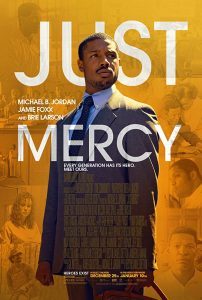
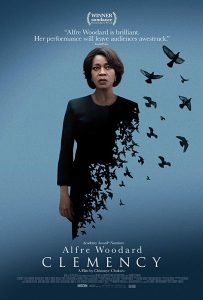
The post Two for One on The Cinema Scribe appeared first on Brent Marchant.
February 3, 2020
‘Clemency’ pushes us to look at our personal morality
“Clemency” (2019). Cast: Alfre Woodard, Aldis Hodge, Wendell Pierce, Richard Schiff, Richard Gunn, Michael O’Neill, Vernee Watson, Dennis Haskins, LaMonica Garrett, Danielle Brooks, Michelle C. Bonilla, Alex Castillo, Alma Martinez. Director: Chinonye Chukwu. Screenplay: Chinonye Chukwu. Web site. Trailer.
Life and death matters generally give us pause to reflect upon our outlook on life, especially from a moral standpoint. But what happens when we’re conflicted? Can we sort out our feelings to come up with beliefs that lead to the right decisions about such issues? Such is the dilemma faced by a high-ranking prison official in the intense new drama, “Clemency.”
Bernadine Williams (Alfre Woodard) has spent many years as the warden of a maximum security prison, and, from the way she’d probably describe herself, she’s done a damned good job at it. Her no-nonsense, by-the-book demeanor governs all of her actions, and she diligently maintains her steely, unflinching façade at all times. That’s true even in moments of high tension, such as the many executions of death row inmates that she has overseen. Always the professional, she never lets emotions get in the way of doing her job.
But all the years of doing this work have slowly taken their toll. As button-down and in charge as Bernadine appears outwardly, she’s beginning to show signs of wear internally. She drinks too much. She has trouble sleeping. She’s quick to dig in her heels when challenged, especially by attorneys seeking to advocate on their clients’ behalf and even by the families of inmates petitioning for special requests. But, most of all, she has difficulty getting close to people, including her loving husband, Jonathan (Wendell Pierce), who’s beginning to have serious doubts about the future viability of their marriage. In fact, the only people with whom she seems to have any kind of meaningful relationships are her fellow employees, particularly Deputy Warden Thomas Morgan (Richard Gunn) and, somewhat ironically, Chaplain David Kendricks (Michael O’Neill). It’s as if she’s an island unto herself, and the tide is ever rising.
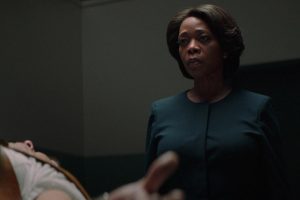
Prison warden Bernadine Williams (Alfred Woodard) oversees executions of death row inmates as part of her job, one that grows increasingly difficult for her, in the tense new drama, “Clemency.” Photo by Eric Branco, courtesy of Neon.
The heat gets turned up further when two volatile incidents occur. The first is an execution gone terribly wrong when the staff responsible for carrying out the procedure is unable to find a suitable blood vessel to insert the IV line used for transmitting the lethal medications into the convict (Alex Castillo). As he writhes in pain, he begins to experience what might readily be called cruel and unusual punishment, a sight that clearly flusters the usually unshakable Bernadine as she seeks to follow through on her duty and maintain as much order as possible.
In the wake of that troubling event, Bernadine is quietly shaken, especially when she begins getting pressured for answers from the press and death penalty opponents. For perhaps the first time ever, she’s less certain about herself, her responsibilities and her willingness to proceed in her capacity as warden. That doubt is further fueled by the scheduling of another upcoming execution, one that involves an inmate, Anthony Woods (Aldis Hodge), who may very well be innocent of the capital crime of which he was convicted. She tries to downplay her feelings, carrying forward in a business-as-usual manner, despite her growing – and increasingly visible – apprehensions. Those feelings become more noticeable to others, such as Woods’s attorney, Marty Lumetta (Richard Schiff), who’s increasingly convinced she can’t hide from her feelings – or herself.
How will Bernadine resolve these issues? Can she remain committed to her job and to the practice of capital punishment? Those are the questions she must address, not only from a vocational standpoint, but also when it comes to how she sees herself and what her work may be doing to her soul. In many ways, one could say she’s just as much a prisoner of her circumstances as are the convicts who reside within her prison’s walls.
Circumstances like this force us to come face to face with ourselves and our beliefs. Because of the high-stakes nature involved, we’d be wholly irresponsible to address them flippantly, dismissively or without thoughtful consideration. And the reason for that is that our beliefs play a crucial role in the reality we experience, a product of the conscious creation process, the philosophy that maintains we draw upon these metaphysical building blocks in manifesting our existence.
When we employ our beliefs to create scenarios as intense as the one presented in this film, we’re treading into potentially dangerous territory. It’s obvious that using conscious creation in such a way is intended to address significant life lessons, the kind that deserve to be treated cautiously, reverently and with all deliberate seriousness given what’s at stake.
These situations give us much to consider. For example, are they something we really want to create? Are we genuinely interested in being (and/or remaining) a part of them? If not, why not? And, if that’s the case, can we find a way to extricate ourselves and change our circumstances? Those are difficult questions, and the answers may not be readily forthcoming – unless we’re willing to take a concerted look at the beliefs that got us into these scenarios and make an effort to change the conditions.
This is clearly what Bernadine is wrestling with in this story. It’s as if she’s painted herself into a corner and doesn’t know how to find her way out of it. She does what she thinks is best to cope with these conditions, but they’re mere bandage solutions based on temporary fixes. To a much greater degree, she’s wrapping herself up in a blanket of denial, refusing to squarely face the beliefs that got her into these circumstances in the first place. And, because of that, she’s effectively trapped, unable to avert her attention away from matters that she can no longer bear to look at. That’s the epitome of being a prisoner of one’s own beliefs.
If Bernadine hopes to escape her situation, she must be willing to look at her beliefs honestly, with a resolute sense of integrity. Why is she doing this kind of work in the first place? Why has she stayed with it so long? And why does she seem to have so much trouble tearing herself away from it? Until she’s able to answer these kinds of questions, she’ll be unable to come up with solutions that help to solve her dilemma.
Even if Bernadine is able to address the foregoing issues, she still needs to ask herself if she’s willing and capable of making changes. Can she envision alternatives that take her away from the self-created hell in which she finds herself? And, if so, does she have any idea what such a new reality might look like? That may be a challenging venture for her, given how long and how deeply she’s been ensconced in her present circumstances. Dragging herself out of those conditions could be more than she’s prepared to handle.
Of course, it’s always possible to do so with help. Bernadine certainly has sources of assistance available to her if she chooses to avail herself of them. First there’s her husband, Jonathan, who genuinely expresses his concern on multiple occasions. Then there are her professional peers, Chaplain Kendricks and Deputy Warden Morgan, both of whom clearly care about her well-being and seem willing to step in when needed. Even attorney Lumetta appears to have some quiet compassion for the warden, despite the many times in which they butted heads. If Bernadine were to reach out to any of these resources, she’d find she has helping hands upon which to draw, but she must decide – and believe – that this assistance would be in her best interests.
The consequences involved here are incalculably high, particularly where Bernadine’s personal welfare is concerned. If she were to turn a blind eye to her innermost beliefs, she faces the possibility of killing someone who’s not ready to die, as well as putting an innocent man to death in error. Can she live with this? Or would she be better off by walking away and beginning a new life, one in which she didn’t have such heavy responsibility on her shoulders and in which she could allow her true self to at last emerge? The choice is hers, and her beliefs will activate the events and circumstances that arise from those choices. We can only hope that she’ll choose wisely given the potential karmic consequences that await her and her mortal soul.

Capital punishment issues are frequently the stuff of robust social discourse, but how often is it scrutinized at the personal level? That’s what this intense new drama seeks to do, both for the executioner and those awaiting that ultimate fate. How does it feel to be the individual on death row? And how does it feel to be the one who orders that the final act be sanctioned? The moral dilemmas faced by all involved may not be as easy or clear-cut to decipher as one might think. Woodard gives a superb (and criminally overlooked) performance, enhanced by the picture’s chilling cinematography and excellent supporting cast. Admittedly, the film could have used more development of the protagonist’s motivations and back story, as well as a slightly brisker pace overall. However, these shortcomings aside, this one is likely to haunt viewers after leaving the theater, giving us all much to think about when it comes to matters of justice, life and death. For its efforts, “Clemency” has picked up three Independent Spirit Award nominations for best feature and screenplay, as well as Woodard’s lead performance.
If we’re not truthful with ourselves when it comes to the kinds of matters examined in this film, there may be hell to pay, be it figurative or perhaps even literal (depending on one’s beliefs). This is why it’s so crucial to get it “right” where these issues are involved. If we don’t, a lasting legacy could dog us for a long time, preventing us from finding peace – and launching us onto a path that might make us long for a resolution that, sadly, ever eludes us.
Copyright © 2020, by Brent Marchant. All rights reserved.
The post ‘Clemency’ pushes us to look at our personal morality appeared first on Brent Marchant.
February 1, 2020
‘Les Misérables’ asks us to examine our intentions
“Les Misérables” (2019). Cast: Damien Bonnard, Alexis Manenti, Djebril Zonga, Issa Perica, Al-Hassan Ly, Steve Tientcheu, Almamy Kanoute, Nizar Ben Fatma, Raymond Lopez, Jeanne Balibar, Fodjé Sissoko. Director: Ladj Ly. Screenplay: Ladj Ly, Giordano Gederlini and Alexis Manenti. Book: Victor Hugo, Les Misérables. Web site. Trailer.
Many of us often look upon the world and wonder why it exists in the state that it does. Some elements seem so patently unfair and incapable of being made better. What’s more, the task of rectifying them is so daunting that it appears to be an impossible undertaking, one clearly beyond our abilities. However, if we make the effort to scrutinize the underlying cause of these conditions, it might not be so difficult to do after all. But that, of course, all depends on us, a message at the core of a modern-day remake of a literary classic, “Les Misérables.”
In the mid-19th Century, legendary French author Victor Hugo (1802-1885) was witness to some of the most turbulent times in his nation’s history, particularly in matters of humanitarianism and social justice. His observations of the circumstances and conditions of the period, especially in the lives of the poor in communities like Montfermeil on the outskirts of Paris, often provided inspiration for his writings, most notably his magnum opus on the subject, Les Misérables, first published in 1862. In that five-volume work, he chronicled the difficulties afflicting the French underclass and their struggles for reform, drawing attention to a subject that had long been ignored and that many in society and officialdom did not want to address. But Hugo’s best-seller struck a chord and pushed French society to begin looking at what it would rather not see.
In the years since then, one would like to believe that we’ve made progress at overcoming those past indignities. However, from the viewpoint of modern-day Montfermeil residents, one might be tempted to remark – trite though it may be – that the more things change, the more they stay the same. That’s especially true for those who live in les Bousquets, high-rise public housing projects that are home to poor, mostly Muslim immigrants from former French colonies in Africa. Even though these residents may look and live differently from those who occupied Montfermeil in Hugo’s time, they face many of the same hardships, and their lives might easily be chronicled in accounts not all that different from what the iconic author wrote.
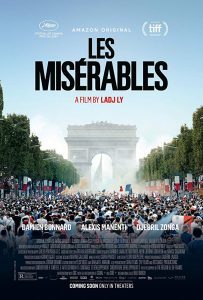
That, in essence, is what this film seeks to impart. Other than a smattering of passing allusions to its source material, the story in this version of “Les Misérables” has little to do with bread-stealing protagonist Jean Valjean and his arch antagonist Inspector Javert (and even less to do with the popular musical adaptation of their decades-long saga). Instead, director Ladj Ly’s offering features a contemporary drama that elaborates upon the humanitarian and social justice themes covered in Hugo’s novel to illustrate how present-day conditions mirror those that the author wrote about. It shows how the downtrodden of today face challenges not unlike those that confronted by their predecessors, that les misérables of the 21st Century may not be all that different from les misérables of the 19th Century and that the title of their story is just as germane to them as it was to their forbears.
In many regards, “Les Misérables” could be characterized as a contemporary crime drama. When recently divorced police detective Stéphane Ruiz (Damien Bonnard) relocates to Paris from rural France to be closer to his son, he takes a job as a beat cop responsible for helping to keep the peace (as much as that’s possible) in the Montfermeil community, a rundown, crime-ridden immigrant neighborhood. It’s a side of Paris many don’t see, one that’s not pictured in travel brochures, yet it nevertheless needs monitoring by authorities to keep matters from getting out of hand.
Ruiz, a mild-mannered, stand-up sort, is not alone in his work. As part of a trio that patrols the streets, he’s joined by Gwada (Djebril Zonga), a Black, easygoing officer who grew up in the neighborhood, and Chris (Alexis Manenti), a White, hot-headed, strong-armed control freak who leads the group and proudly relishes his nickname “Pink Pig.” Together they seek to keep order, frequently employing questionable practices (generally initiated under Chris’s direction) and paying regular visits to street allies, such as Le Maire (“the Mayor”) of Montfermeil (Steve Tientcheu), the head of the community’s criminal underworld who helps keep a lid on neighborhood violence while handsomely lining his own pockets. It’s all somewhat unsavory in Ruiz’s mind, but he goes along with the routine as much as he’s able to, often clashing with Chris in the process.

Newly arrived police recruit, Stéphane Ruiz (Damien Bonnard, left), starts his first day on patrol of the Montfermeil neighborhood of Paris with his colleagues, group leader “Pink Pig” Chris (Alexis Manenti, center) and patrolman Gwada (Djebril Zonga, right), in director Ladj Ly’s Oscar-nominated feature, “Les Misérables.” Photo courtesy of Amazon Studios.
The relative “calm” in the neighborhood becomes upset, however, when Zorro (Raymond Lopez), the gypsy owner of a small travelling circus, angrily complains to Le Maire that someone from his community stole his beloved lion cub, demanding the animal’s return under the threat of a repeat visit the next day “with guns blazing.” The Mayor claims to know nothing about the lion’s disappearance and calls in his police associates to help sort out the situation.
Chris, Gwada and Ruiz agree to help Le Maire in the search for the missing animal, an investigation that leads to strained relations between the Mayor and others in the neighborhood, most notably Salah (Almamy Kanoute), an influential and devout business owner with a strong local following. But, thanks to Ruiz’s soothing mediation skills, tensions ease somewhat. And, with some astute police work, the officers quickly find the lion cub in the possession of Issa (Issa Perica), a teenage troublemaker with a long history of run-ins with authorities. However, retrieving the cub is easier said than done; when Issa flees, he’s joined by other local teens who run interference for him, thwarting the officers’ attempts at capturing the perpetrator. In the crush of the moment, the mob creates havoc that results in the firing of a flash-ball weapon, injuring the suspect. And, to complicate matters further, the entire incident is captured on video by an overhead drone operated by a shy, geeky teen, Buzz (Al-Hassan Ly), who becomes the subject of a new investigation – one aimed at seizing the device to prevent footage of the incident from being revealed to the public.
The combination of a seriously injured, unpredictable teenage perpetrator, documented footage of the incident in which he was hurt, the desperate search for the owner of the drone that captured images of the volatile event, and an attempt at a deliberate police cover-up make for a highly combustible mix. Add to that the strained relations between Le Maire and neighborhood residents, and the heat gets turned up even further. It all makes for an explosive situation, one that threatens to erupt and create even greater chaos, an episode with the potential to reaffirm everything that Victor Hugo presciently wrote about nearly two centuries earlier.

Le Maire (“the Mayor”) (Steve Tientcheu), head of the criminal underworld in the Montfermeil neighborhood of Paris, seeks to keep a lid on community violence while lining his own pockets in the Oscar-nominated feature, “Les Misérables.” Photo courtesy of Amazon Studios.
The similarity of life in Montfermeil in 2019 compared to the 19th Century raises some interesting – and puzzling – questions. For all of our supposed compassion, tolerance and advanced knowledge, how is it that these kinds of conditions persist? Why do people continue to suffer? Why do we cling to different standards of acceptance – and hence exhibit different standards of behavior – toward different groups of individuals in such areas as justice, opportunities for economic and social advancement, and humanitarian treatment? And, despite changes in the material nature of our world, why have we remained stuck in our outlooks when it comes to how we treat others and how we interrelate with them? Indeed, did we learn nothing from Hugo’s writings?
If we have a hard time fathoming how such conditions have endured during all that time, then maybe it’s time we take a good hard look at ourselves. And, in particular, maybe we should pay special attention to our beliefs, for they provide the building blocks of the reality around us, the cornerstones of the conscious creation process, the philosophy that maintains we draw upon them in manifesting the existence we experience. These tremendously powerful intangible elements spring forth from within us to materialize our external reality. And, for better or worse, what we get faithfully mirrors the source from which it originates, persisting for as long as such notions continue to receive the power we give to them.
If we consider that, then, it speaks volumes about those questions raised above. If the present-day conditions mimic those of the past with little meaningful change, then we’ve obviously allowed the underlying beliefs that created them to endure. Whether we’ve played an active part in their preservation (as Chris, Le Maire and Issa do, for example) or merely stood on the sidelines as onlookers (as, say, Gwada does), many of us have had a hand in maintaining them with little, if any, change. The power and persistence of these beliefs, in turn, make it difficult for those who hope to see improvement (as evidenced by the frustration Ruiz experiences). In the end, if any of us really hope to see progress made, we have to start with our beliefs, rewriting them as needed to bring about the kinds of adjustments we seek.
This is not to suggest that change is impossible. The power that we give to our beliefs is essentially a neutral force, neither good nor bad; it all depends on what we do with it through the “applications” to which it is put. As Hugo wrote in Les Misérables, “There are no such things as bad plants or bad men. There are only bad cultivators,” and this is just as true where our beliefs are concerned. The same energy that goes into creating something nefarious or injurious could just as easily be applied to the manifestation of something beneficial or joyful. Consider, for instance, the film’s opening sequence in which the residents of Montfermeil join in the jubilation of their fellow Parisians at the Arc de Triomphe to revel in France’s victory at the World Cup soccer championship, a celebration born out of a wellspring of upbeat intentions. By contrast, however, the energy applied so readily to that undertaking could just as well be infused into the criminal activities that those same individuals engage in when they return to their home neighborhood. The question, of course, is, “What will they choose to do?”

The restless and discontented youth of les Bousquets, the rundown public housing projects of the Montfermeil neighborhood on the outskirts of Paris, face a difficult and frustrating upbringing in director Ladj Ly’s gripping new retelling of the classic Victor Hugo novel, “Les Misérables.” Photo courtesy of Amazon Studios.
This is where paying attention to the nature and content of our beliefs comes into play. And, for those who may lack the insight to know how to proceed at this, that is where the impact of beneficial role models can make all the difference. If the Montfermeil residents had more people like Ruiz than like Chris or Le Maire in their lives, they might very well make different choices regarding their beliefs – and, consequently, experience a very different reality from what they’re accustomed to. And, if there were enough Ruizes in the life of the community, then maybe the kinds of reforms Hugo pushed for might finally begin to be realized in greater numbers. But, no matter what unfolds, it all comes back to the beliefs that are put into place to begin with.
It should be noted that, as in Hugo’s age, Montfermeil is far from an isolated example in our world today. There are many communities like it around the globe where conditions are as bad as, if not worse, than there. The violent events in this film, not unlike the 2005 Paris riots on which portions of this picture were inspired, should serve as a wake-up call, not only to change the conditions, but also to change the underlying beliefs that have brought these conditions into play in the first place. “Les Misérables” is a good starting point to draw from, providing us with a powerful cautionary tale we should all take to heart.
This stunning urban crime drama adaptation provides a gritty, contemporary twist on the notions of liberty, equality, fraternity and social justice (and their all-too-frequent absence) all these many years later. Director Ladj Ly’s Oscar-nominated offering for best foreign language film, influenced strongly by Spike Lee’s “Do the Right Thing” (1989), hits hard, seldom holding anything back. With its fine performances, excellent cinematography and compelling electronic soundtrack by Pink Noise, the film captivates as it works its way through an increasingly tense narrative that leaves as many questions open as it resolves. This version of “Les Misérables” may not superficially resemble any of those that preceded it, but it leaves an impact just as emotionally powerful – if not more so – than any of its predecessors, bringing Hugo’s message into the present and shoving it squarely in our faces.

Paris erupts in jubilation at the nation’s victory in the World Cup soccer championship, a rare moment of joy in “Les Misérables,” a contemporary adaptation of the classic Victor Hugo novel about the challenges faced by the downtrodden in French society. Photo courtesy of Amazon Studios.
Were it not for the existence of Bong Joon Ho’s masterpiece “Parasite” (“Gisaengchung”), “Les Misérables” might otherwise be the best foreign language film of 2019, a distinction that likely would have made it possible to sweep all the honors in this category in the movie industry’s various awards competitions. As it is, the picture earned the Jury Prize at the Cannes Film Festival and was a nominee for the Palme d’Or, the event’s highest honor. Since then, however, in addition to its Oscar nod, the film has consistently pulled down nominations in the Golden Globe, Critics Choice and Independent Spirit Award contests, accolades of which it is certainly deserving and, in another year, might have easily translated into victories. But, even without a trophy case full of hardware, this is a picture well worth its weight in praise and definitely worth seeing.
Bringing fairness and justice into the world is something mankind has sought to do throughout its history, with varying degrees of success. Some can argue that we have indeed made progress, and they can point to a number of noteworthy examples. But, as long as certain basic inequalities are allowed to endure, we’ll never live up to the promise and potential of what we might be able to achieve as a species. We can only hope that Victor Hugo’s message sinks in at some point – and that we truly become what we’re genuinely capable of.
Copyright © 2020, by Brent Marchant. All rights reserved.
The post ‘Les Misérables’ asks us to examine our intentions appeared first on Brent Marchant.
January 29, 2020
This Week in Movies with Meaning
Reviews of “Just Mercy” and “The Two Popes,” as well as my Oscar predictions, are all in the latest Movies with Meaning post on the web site of The Good Media Network, available by clicking here. 
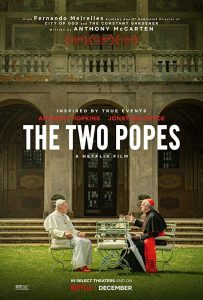




The post This Week in Movies with Meaning appeared first on Brent Marchant.
‘Just Mercy’ chronicles the quest for justice
“Just Mercy” (2019). Cast: Michael B. Jordan, Brie Larson, Jamie Foxx, Rafe Spall, Tim Blake Nelson, O’Shea Jackson Jr., Rob Morgan, Darrell Britt-Gibson, Karan Kendrick, Michael Harding, Lindsay Ayliffe, Dominic Bogart, C.J. LeBlanc, Andrene Ward-Hammond, Rhoda Griffis. Director: Destin Daniel Cretton. Screenplay: Destin Daniel Cretton and Andrew Lanham. Book: Bryan Stevenson, Just Mercy. Web site. Trailer.
One would like to hope that justice is served every time a legal matter arises, but, fortunately (or perhaps unfortunately), most of us are wise enough to realize that’s not the case. That’s especially troubling in proceedings where capital punishment is concerned, given the ramifications involved. We can only hope that matters turn out as they should and that the truth is not sacrificed in the process. Such is the dicey conundrum raised in the gripping new, fact-based legal drama, “Just Mercy.”
In 1986, logger Walter “Johnny D.” McMillan (Jamie Foxx) was on his way home from working in the woods near Monroeville, Alabama, when he was stopped at a roadblock and questioned by the local sheriff (Michael Harding). Perplexed at what was happening, Walter quickly learned that he was the prime suspect in the murder of Ronda Morrison, an 18-year-old dry cleaner clerk, a crime for which he was subsequently arrested, convicted, imprisoned and sentenced to death.
The fact that the murder victim was a White woman and that Walter was a Black man was passed off as incidental. But, with this being small-town Alabama, old prejudices lingered even decades after the days of the Civil Rights Movement and despite the fact that Walter had no history of violence. In fact, the only “notoriety” he had earned was for a widely known extramarital affair that he had with a White woman, something that, in the minds of authorities, somehow automatically made him a suspect in an otherwise-unrelated murder. And, because of this, an innocent man now faced the prospect of execution for a crime he didn’t commit. However, an advocate for Walter’s justice would soon be on his way.

In 1989, idealistic young African-American lawyer Bryan Stevenson (Michael B. Jordan) moved to Alabama to work with poor individuals who could not afford legal representation. Having grown up in Delaware with Northern sensibilities, this relocation to the South was something of an eye-opener for the Harvard Law School graduate. However, despite the differences in attitude, Stevenson was by no means naïve, a trait that enabled him to navigate the local conditions and prompted him to work even more aggressively on his clients’ behalf. That was particularly true when he began assisting prisoners on death row.
With the assistance of inmate rights advocate Eva Ansley (Brie Larson), Bryan launched the Equal Justice Initiative to help the underprivileged. But, when he initially met with Walter, he found his prospective client to be quite discouraged, essentially reconciled to his fate. In fact, Bryan had to work hard to convince Walter that it was worth making the effort to take another look at his case. It proved to be a worthwhile decision.
Bryan quickly learned that local officials were so anxious to allay public fears about Morrison’s death that they were willing to do virtually anything to obtain a conviction to be able to say that the murder had been solved, whether or not that was indeed true. In line with that, Bryan discovered that Walter had been found guilty on the basis of flimsy evidence, mostly the questionable and contradictory testimony of convicted felon Ralph Myers (Tim Blake Nelson), who apparently agreed to provide authorities what they wanted in exchange for a lighter sentence in his own pending trial. What’s more, numerous witnesses who placed Walter at a church fish fry at the time of the murder were never questioned about their knowledge of his whereabouts. So, given the foregoing, Bryan sought to get Walter a new trial, one through which he was convinced his client would be exonerated.
However, moving forward proved more difficult than anticipated. When Bryan met with prosecutor Tommy Chapman (Rafe Spall) to seek his cooperation, he refused to help. And, when McMillan family friend Darnell Houston (Darrell Britt-Gibson) agreed to testify in Walter’s defense, he was arrested for perjury, a deliberate act of harassment by authorities aimed at intimidating a potentially key witness from speaking up. These developments called for Bryan to become more aggressive – and more creative – in coming up with tactics to counter opponents who were committed to thwart the attorney’s efforts at every turn. But, with an innocent man’s life on the line, drastic measures are sometimes necessary, as Bryan and Walter found out as their story played out.
It’s a pretty safe bet that the majority of us believe in the notion of fairness, especially where justice is concerned. That’s why it so strongly irks us when we see it being compromised or circumvented, especially in legal matters. That’s perhaps most true where capital crimes and punishment are involved; getting things right is so supremely important, because there’s no going back once the sentence is carried out. And pity those who get it wrong.
The strength of our feelings about such matters is so great because of the beliefs that underlie them. Over time, those beliefs gradually translate from theoretical constructs into tangible, realized outcomes, and, given that they relate to life and death matters and the ultimate fate of living and breathing individuals, there’s much at stake, a testament to the power behind these notions. Because of that, we must proceed with the utmost of caution when addressing these issues and the beliefs that underlie them, for they will surely result in manifestations of their original essence, just as anything else does that arises through the conscious creation process, the philosophy that explains how such tangible outcomes are brought into being.
This naturally raises the importance of our manifesting beliefs being infused with truthfulness, sincerity and, above all, integrity. We must be scrupulously thorough in processing such matters, doing all we can to discover the truth, formulating beliefs in line with that and coming up with solutions that adequately address the matters at hand. This is no time to let undue prejudices interfere with our scrutiny. This is no time to let laziness or sloppiness impinge upon our analyses. And, most of all, this is no time to put on blinders or leave things to chance. We must be clear in our beliefs considering that we hold another’s life in our hands.
Which is why it’s so vital that the accused have astute, courageous advocates who can stand up for those who may not be able to fight for themselves as effectively as they otherwise might. These champions often possess the qualities described above and don’t hesitate to employ them in their beliefs and actions to aid those whose lives hang in the balance. They’re firm in their commitments to get at the truth and to raise it to the surface in the cause of justice, as well as in defeating those who would deliberately use subterfuge to subvert this principle and serve their own particular agendas. And, if these advocates perform their duties as they should, the truth will out.
As noted above, engaging in such endeavors requires facing one’s fears, for if these apprehension-based beliefs are allowed to hold sway, they could easily undermine efforts at getting to the truth. This can be difficult even for those who are perceived as being intrinsically powerful. Consider Bryan’s foray into the Alabama criminal justice system of the 1980s and ʻ90s. Despite his Harvard degree, his legal expertise and the backing of the law, he was nevertheless treading into heavily prejudicial territory where many believed a Black man simply was not supposed to wield that kind of power in the first place (let alone be able to make use of it in the support of a racial peer who had been allegedly rightfully convicted of a crime for which he was now living out the sentence served upon him). Such an undertaking could be seen as akin to stepping into the lion’s den, an act of true courage, the kind that sweeps aside fear-based beliefs and enables one to move forward forthrightly to achieve a just and resolute outcome. Now, this is not to suggest that every attorney is some kind of superhero, but those who willingly take on ventures like this often possess the right mix of beliefs to carry out their missions, backed by the types of acumen and actions needed to facilitate them.
As valuable as integrity and courage are, however, sometimes they may not be enough under especially tricky circumstances, as Bryan discovered in his defense of Walter. He found that he needed to get creative in his approach, tapping into his imagination and devising unconventional plans to move his case forward. Given the obstacles being placed before him, Bryan needed to come up with beliefs for solutions that obliterated these limitations and enabled him to get his client’s case heard. This is the kind of ingenuity that conscious creation is designed to help foster, and, fortunately, Bryan had the vision to employ it in his efforts. And, even if he never heard of this philosophy, he obviously understood its principles, making use of them in masterful ways in the face of formidable opposition.
Those who excel in endeavors like this often reap tremendous rewards for their work. But, then, that’s because they’re driven to do it in the first place, following their hearts and beliefs to get the job done – and feeling the devastation when they don’t, incidents that ultimately prompt them to work that much harder at achieving success the next time around. What’s most important, though, is that they stick with their initiatives, because such efforts represent their value fulfillment, the conscious creation concept associated with being our best, truest selves for the betterment of ourselves and those around us. In the work that Bryan did in Walter’s case, and in the many others with additional clients that followed, he has lived out his value fulfillment, bringing attention – and rectification – to many seemingly hopeless situations where justice indeed needed to be served.
Despite some occasional pacing issues and a storytelling approach that’s fairly conventional for films of this type, “Just Mercy” nevertheless reaches out and grabs viewers with an intensity that earns the genuinely heartfelt emotions it evokes from audiences. With fine performances by Jordan and Screen Actors Guild Award nominee Foxx, the picture touches in ways that movies of this stripe typically don’t despite similarity in subject matter and narrative. In fact, the film is so effective in conveying its message that it received the Freedom of Expression Award from the National Board of Review.
One would think in this day and age that we shouldn’t need films with stories like this any more, that we’ve moved beyond having to be reminded of messages like this. Various other pictures, such as “Crown Heights” (2017), “Brian Banks” (2018), “Monsters and Men” (2018) and the recently released “Clemency” (2019), among others, have poignantly dealt with issues of miscarriages of justice and/or questionable death sentences involving minorities, so another story in this same vein might easily be seen as redundant. Yet, given the prevailing conditions in our increasingly polarized society, it’s obvious the need is still there, and, thankfully, we have pictures like “Just Mercy” to step up and help fill that void. Let’s hope that need disappears one day – and preferably sooner rather than later.
Copyright © 2020, by Brent Marchant. All rights reserved.
The post ‘Just Mercy’ chronicles the quest for justice appeared first on Brent Marchant.
January 28, 2020
‘The Two Popes’ explores the evolution of one’s destiny
“The Two Popes” (2019). Cast: Anthony Hopkins, Jonathan Pryce, Juan Minujin, Luis Gnecco, Cristina Banegas, Achille Brugnini, Sidney Cole, Willie Jonah, Germán de Silva, Lisandro Fiks, Renato Scarpa, Federico Torre, Daniel Di Cocco, Josello Bella. Archive Footage: Pope Benedict XVI, Pope Francis. Director: Fernando Meirelles. Screenplay: Anthony McCarten. Play: Anthony McCarten, The Pope. Web site. Trailer.
Getting to where we’re meant to be in life sometimes takes us down some unusual and unexpected paths. We may stand back and wonder why we’re going in a certain direction when we’re convinced we’re supposed to go another way. But, no matter how seemingly far afield we may wander, we often find we’re on exactly the right course, and the journey is one of our own making, based on our innermost heartfelt sentiments. It’s a process exemplified in the new fact-based historical drama, “The Two Popes.”
With the death of Pope John Paul II in 2005, the College of Cardinals convened to elect a successor. The conclave came at a critical time in the history of the Roman Catholic Church, one whose outcome would play a significant role in the future direction of the institution. Would the Cardinals elect a new pope from the conservative arm of the Church in an effort to preserve its longstanding traditions, policies and practices? Or would they strike out in a new direction, choosing a reformer who would bring the Church into the 21st Century and more in line with a world characterized by ever-changing conditions?
In the end, this schism was clearly reflected in the results. The College elected German Cardinal Joseph Ratzinger (Anthony Hopkins) to become Pope Benedict XVI, a staunch dogmatic conservative determined to preserve the institution’s time-honored conventions, a choice disapproved of by many progressive-minded Catholics who believed their concerns would be ignored (and who not so subtly mistrusted the ascension of a German to the papacy). Meanwhile, the runner-up in the balloting was Cardinal Jorge Bergoglio (Jonathan Pryce), the Archbishop of Buenos Aires, Argentina, a reformer who saw a pressing need for the Church to reconsider the close-minded positions of many of its policies, an effort aimed at stopping the exodus of Catholics (especially young ones) from the institution. But, having lost out on his bid to become John Paul’s successor, the Cardinal discreetly returned to Latin America to carry on his work in his home diocese.

Pope Benedict XVI (Anthony Hopkins, left) and Cardinal Jorge Bergoglio (Jonathan Pryce, right) exchange a series of diverse, sometimes-contentious views about the future of the Church in the new historical drama, “The Two Popes.” Photo by Peter Mountain, courtesy of Netflix.
Seven years later, however, Benedict’s reign became embroiled in a series of incendiary incidents that came to be known collectively as the Vatican Leaks Scandals. His ability and willingness to carry on under a microscope of global scrutiny made him quietly but decidedly leery about his future as Pope.
At the same time, a world away, Cardinal Bergoglio began to question his own future, sending a letter to Benedict seeking permission to retire from his position. That inquiry went unanswered for a prolonged period until one day when he was unexpectedly summoned for an audience with the Holy Father. Ironically, he already had a plane ticket for the trip in hand – one that he purchased before receiving the pontiff’s notification.
Meeting at the Palace of Castel Gondolfo, the Pope’s summer residence outside of Rome, Benedict and the Cardinal convened for a series of discussions. The tone was initially contentious, each symbolically reflecting the views that they held regarding the state and future of the Church. And, to confound matters further, Benedict repeatedly refused to address the Cardinal’s retirement request. The cryptic progression of events prompted Bergoglio to wonder why he was asked to come visit in the first place.
In quiet moments together, however, the formal veneer between the two clerics began to drop as each of them spoke about their interests and personal histories. The Pope talked about his musical background and his favorite TV show, among other topics. Meanwhile, the Cardinal spoke about his calling to the Church, citing the time when his younger self (Juan Minujin) broke off his engagement to his fiancée (Cristina Banegas) and joined the Jesuits. Thus began Bergoglio’s odyssey of faith, a journey that took him through a diverse array of religious and secular experiences that brought him to where he was at that moment.

Upon the death of Pope John Paul II in 2005, the College of Cardinals convene for a conclave to select a successor in director Fernando Meirelles’s latest offering, “The Two Popes.” Photo by Peter Mountain, courtesy of Netflix.
Shortly thereafter, with the scope of the scandals widening, Benedict returned to Rome, accompanied by the still-perplexed Cardinal. But, upon their arrival at the Vatican, the Pope’s reasons for wanting to meet with the Cardinal at last became clear – that he was planning to step down from the papacy and wanted Bergoglio to be his successor, something the Holy Father wouldn’t be able to do if he were to grant the Cardinal’s retirement request.
Needless to say, the Cardinal was shocked. The thought of a pope resigning was virtually unheard of; it represented a break in ecclesiastical and administrative continuity that was seen as inconceivable and unacceptable. And the prospect of ascending to the papacy as Benedict’s successor was overwhelming; Bergoglio felt undeserving of the distinction, especially in light of troubling incidents from his past, most notably his perceived collaboration with Argentina’s military junta in its handling of the nation’s political and social “undesirables” (including fellow Jesuits) during the days of the Dirty War from 1976 to 1983. Through flashbacks interspersed with the clerics’ conversations, viewers witness a younger Bergoglio struggle with his conscience over the handling of these events, particularly where safeguarding the well-being of his colleagues Father Franz Jalics (Lisandro Fiks) and Father Orlando Yorio (Germán de Silva) was concerned, a painful episode that resulted in the future Cardinal’s demotion to a parish priest in a remote locale.
However, the more Benedict and Bergoglio conversed, the more revelatory, profound and reflective their discussions became. It also became apparent that they each had a destiny to fulfill and that they were now at the cross-roads of seeing their fates realized. It would not be long before the Cardinal from so far away would be named the first Jesuit pontiff, Pope Francis.
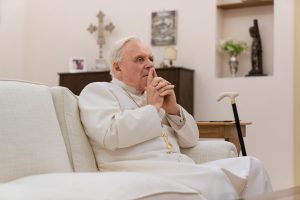
Pope Benedict XVI (Anthony Hopkins) contemplates the radical move of resigning from the papacy in the new, Oscar-nominated drama, “The Two Popes.” Photo by Peter Mountain, courtesy of Netflix.
Assuming the role of pope would likely be a daunting task for virtually anyone. It’s an act that carries tremendous responsibilities, not only administratively, but also spiritually. It’s the kind of undertaking that calls for looking deeply within and getting in touch with one’s heart. This frequently calls for making an honest and sincere assessment of one’s innermost intimate beliefs, an ability to take an accurate and comprehensive inventory of these notions as a means for carrying out the duties of the office. And that’s important, for that heartfelt input plays a crucial role in determining the course of events in the Church and, conceivably, in helping to shape the nature of the world at large. Some would call this doing God’s will; others might just as readily say this is an example of the conscious creation process at work, the philosophy that maintains we draw upon these inner intangible resources in manifesting the existence we experience.
There are many examples of this process – and its outcomes – at work in this film. For instance, as becomes apparent early on, Benedict and Bergoglio each become symbolic embodiments of their viewpoints on how they see the Church. Each is a living and breathing personification of their respective outlooks, with Benedict representing the conservative traditionalist and Bergoglio the progressively minded reformer. And those exemplifications (and everything stemming from them) come directly from the beliefs each of them hold.
The clerics’ success at this practice arises from their ability to hear – and listen to – the small, still voice within each of us. Some might call this a search for the word of God, while others might think of this as tuning in to our intuition, a key component in belief formation. Such a distinction is probably more semantic than anything else, given that the results that arise from whatever one calls it are likely the same in each case. This is important, though, considering what can develop from heeding the advice that comes from this practice. For example, when the Cardinal purchased his plane ticket to Rome before receiving the Pope’s summons for a meeting, he wasn’t entirely sure why he was doing so. But his intuitional/divinely inspired hunch proved correct in light of what happened by making the purchase and taking the trip, even if his expectations for the journey didn’t precisely align with the eventual outcome.

Cardinal Jorge Bergoglio (Jonathan Pryce) considers the daunting possibility of being named a successor to retiring Pope Benedict XVI in the new historical drama, “The Two Popes.” Photo by Peter Mountain, courtesy of Netflix.
Tapping into one’s beliefs also plays a significant role in learning how to balance our inner and outer worlds. As conscious creators know, we draw upon our intangible beliefs to materialize what we experience in our tangible reality, and an acute awareness of this intrinsically connected duality is crucial to those who practice this philosophy, especially anyone engaged in a principally spiritual vocation. By placing excessive emphasis on the inner spiritual realm, we may come to feel less in touch with the physical existence of which we’re just as much a part. While there’s nothing wrong with having a robust spiritual orientation, we must also remember that we’re present in the outer world as well. To that end, ideally we should seek to strike a healthy balance between the two and eschew the temptation to become irretrievably locked into the intangible alone.
As the film illustrates, Benedict often seems so wrapped up in the ecclesiastical life that he loses sight of the real world around him. He’s seen as out of touch and aloof, trying to impose his limited and outmoded worldview on a reality characterized by a greater range of diversity, a narrow outlook that’s kept him from being aware of many of even the most basic aspects of everyday life. The Cardinal, by contrast, has a firm grasp on recognizing the significance of both the spiritual realm from which he draws inspiration and guidance and the physical world in which he dwells. This makes him more pragmatic, more in touch with the commonplace elements of living. He even makes plain his love of such secular pursuits as World Cup soccer and dancing the tango, diversions one may not readily associate with a cleric of his standing. But his ardent attraction to these pastimes illustrates that he’s just as much in the world as he is in his heart.
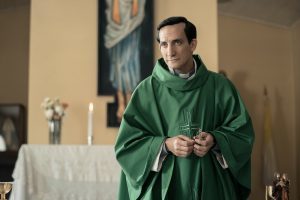
Having been demoted to the position of a parish priest in a remote locale after suspicion of collaborating with Argentina’s military junta during the Dirty War of 1976-83, a young Jorge Bergoglio (Juan Minujin) seeks to find meaning in his calling in “The Two Popes.” Photo by Peter Mountain, courtesy of Netflix.
Beliefs also figure significantly into our ability to overcome limitations, as is very much the case with the Cardinal. In many respects, his ascendancy represents a number of firsts: He’s the first Jesuit pope. He’s the first pope from the Americas. And he’s the first pope from the Southern Hemisphere. What’s more, he’s an individual who successfully managed to rise from some of the lowest ranks within the Church to its highest office. And it’s an accomplishment attained by someone who felt unworthy of it, the endorsements and support of others notwithstanding. His experience shows us we can achieve what might seem unthinkable, an inspiring attainment we can all draw from.
As the foregoing shows, using beliefs to satisfy worldly goals is obviously important, but drawing upon them to fulfill intangible objectives is just as significant and attainable, even if the prospect seems less likely. For example, both Benedict and the Cardinal have issues regarding a desire for redemption and forgiveness, something that they each long for but that they both believe may be out of their grasp. However, as conscious creators are aware, beliefs can be used to achieve anything, tangibility considerations aside. When we’re firmly rooted in our beliefs – and have the faith to see them realized – there’s no telling what wishes we can see come true. “Ask and ye shall receive,” it would seem, is a notion not limited to religious texts.
The lives of Benedict and Bergoglio indeed illustrate a rich and fulfilling metaphysical experience, and, from a conscious creation standpoint, they epitomize one of the philosophy’s cornerstone concepts – that everything is in a constant state of becoming. This is especially true for the Cardinal, as seen by his life path. As an individual who sacrificed much to earnestly pursue his faith (and endured numerous hardships along the way), he managed to overcome setbacks and ascend to the highest office of the Church. Bergoglio’s life clearly demonstrates this metaphysical evolution at work, something that ever steers him toward his destiny and that can even occur with stunning speed (such as when he went to Rome to resign and ended up becoming the heir apparent to the papacy). What a remarkable existence indeed.

At the cross-roads of their respective destinies, Pope Benedict XVI (Anthony Hopkins, left) and Cardinal Jorge Bergoglio (Jonathan Pryce, right) discuss their future roles in the Church in the new historical drama, “The Two Popes.” Photo by Peter Mountain, courtesy of Netflix.
This modestly engaging look at the sometimes-contentious, sometimes-brotherly relationship of Pope Benedict XVI and the future Pope Francis details how this highly unusual transition came into being (and why), particularly from the standpoint of the personal motivations involved. However, while this insightful offering (both in philosophical and historic terms) features fine performances by Hopkins and Pryce, as well as a number of thoughtful dialogues about faith, tradition and the future of the Church, the picture’s sometimes-uneven pacing and occasionally wooden, somewhat stagey exchanges tend to bog down the flow of the narrative despite the best efforts of its two leads to conceal these shortcomings. This is by no means a bad film, but it doesn’t always live up to the hyped praise it’s received, either. The picture, which played briefly at a number of film festivals last fall, is now available for online streaming.
The praise that the film has earned has been accompanied by a number of awards season accolades, most notably three Oscar nominations for the performances of Hopkins and Pryce, as well as for its adapted screenplay. The picture duplicated these honors in the BAFTA Awards contest, with additional nods for best casting and best British film. And, in earlier competitions, this release received two Critics Choice Award nominations for the performances of Hopkins and Pryce and four Golden Globe Award nods for best dramatic picture, best screenplay and the portrayals of the two popes.

It’s been said “The Lord works in mysterious ways.” Those at the pinnacle of the religious hierarchy clearly understand this. But it’s also true for conscious creators who implicitly place their trust in our divine collaborator, the one who works Its magic to help us transform our intentions into realized dreams (even if It doesn’t necessarily take the route we think It should). What ultimately matters, though, is that we arrive where we’re meant to be, ever evolving to fulfill our wishes and our destiny and, one would hope, to create a better world for us all.
Copyright © 2020, by Brent Marchant. All rights reserved.
The post ‘The Two Popes’ explores the evolution of one’s destiny appeared first on Brent Marchant.
January 27, 2020
Check Out TheCoffeeCast
Who will end up taking home statues on Oscar night? Find out my predictions in my annual irreverent look at the movies’ high holidays on the latest edition of TheCoffeeCast with host Tom Cheevers, available by clicking here. Sensitive listeners, please be advised, strong language warning!

The post Check Out TheCoffeeCast appeared first on Brent Marchant.
January 24, 2020
Who Will Win This Year’s Oscars?
It’s that time of year again – time for my predictions of the winners at the upcoming annual Academy Awards. While some of the likely winners are beginning to come into view, a few are still up for grabs. With that said, here are my picks for who will take home statues in the top six categories this year:
Best Actor

The Field: Antonio Banderas, “Pain and Glory” (“Dolor y gloria”); Leonardo DiCaprio, “Once Upon a Time…in Hollywood”; Adam Driver, “Marriage Story”; Joaquin Phoenix, “Joker”; Jonathan Pryce, “The Two Popes”
Who Will Likely Win: Joaquin Phoenix. Having picked up the Golden Globe, Critics Choice and Screen Actors Guild Awards for this portrayal, and with the exclusion of his chief competitor (Taron Egerton for “Rocketman”) from the field, Phoenix probably doesn’t face any serious threats from his fellow nominees, despite the generally good quality of their performances. Given that this is Phoenix’s fourth Oscar nomination without a win, Hollywood is probably ready to honor him for what is arguably the best performance of his career.
Who Should Win (Based on the Nominees): Adam Driver. As impressive as Phoenix is in “Joker,” there are many aspects of his performance that are rather repetitive and arguably monodimensional. In light of that, I would give the edge in this category to Driver due to the greater range of required elements. Unfortunately, Driver may not have enough backing to put him over the top this time, but it could be looked upon as a significant down payment toward a future award.
Who Should Win (Based on All Eligible Candidates): Taron Egerton, “Rocketman.” As the winner of the Golden Globe Award for best actor in a comedy or musical, Egerton is the class of 2019’s field of eligible lead actors. His portrayal of rock icon Elton John is positively outstanding, and his snub as a nominee in this field is inexcusable. Perhaps Rami Malek’s win for his role as legendary rocker Freddie Mercury in last year’s “Bohemian Rhapsody” may have hurt Egerton’s chances this year, as some Academy voters may have been reluctant to recognize two consecutive portrayals of pop musicians. That’s a pretty flimsy excuse, though; superb performances are superb performances and should be recognized as such, despite whatever similar roles may have preceded them. With film biographies of other rock musicians already in the works, this could work against those seeking to play those parts, and that would be a shame if their work merits attention.
Possible Dark Horse: Antonio Banderas. This is admittedly a very, very, very long shot at this point, but, as the winner of the best actor award at the 2019 Cannes Film Festival, he can’t be completely ruled out, despite the incredibly long odds.
Also-Rans: Leonardo DiCaprio and Jonathan Pryce. Having won an Oscar for “The Revenant” just a few years ago, it’s likely too soon for DiCaprio to pick up another award, despite the fact that his performance was the only redeeming element of his film. As for Pryce, he should consider his nomination as his award, a well-earned honor for someone who has turned in a number of fine performances over the years (especially in last year’s “The Wife”) and has always been overlooked.
Who Should Have Been Left Out: Leonardo DiCaprio and Antonio Banderas. As good as DiCaprio was, there were a number of other performances that probably could have trumped this one (see below), especially since his chances of winning are so low that this nomination is something of a throwaway. And, where Banderas is concerned, his portrayal was good but certainly not extraordinary (makes me wonder how he won at Cannes as well). Again, another candidate would have made a better choice.
Who Else Should Have Been Considered: There were a number of other worthy performances deserving of consideration, including Adam Driver, “The Report”; Kelvin Harrison Jr., “Luce”; Taron Egerton, “Rocketman”; Roman Griffin Davis, “Jojo Rabbit”; John Lithgow, “The Tomorrow Man”; Paul Walter Hauser, “Richard Jewell”; George MacKay, “1917”; and Michael B. Jordan, “Just Mercy.”
Snubs: Some Oscar watchers were surprised at the exclusion of Adam Sandler from the field for his rare dramatic performance in “Uncut Gems.” But, to be honest, it’s an overrated portrayal, one not all that different from the kind he often gives in many of his alleged comedic turns only in a serious context. Academy voters got this one right. What they got wrong, though, as noted above, was the exclusion of Taron Egerton for “Rocketman.” That oversight was just downright wrong.
Best Actress

The Field: Cynthia Erivo, “Harriett”; Scarlett Johansson, “Marriage Story”; Saoirse Ronan, “Little Women”; Charlize Theron, “Bombshell”; Renée Zellweger, “Judy”
Who Will Likely Win: Renée Zellweger. This is Zellweger’s award to lose. As the pre-awards season favorite, and with victories in the National Board of Review, Golden Globe, Critics Choice and Screen Actors Guild Award contests, Zellweger has a virtual lock on this category.
Who Should Win (Based on the Nominees): Renée Zellweger. Despite some other fine portrayals in this category, Zellweger is nevertheless head and shoulders above her competitors, delivering such a powerful and authentic depiction of entertainment legend Judy Garland that one would swear she was channeling the Hollywood icon. This is clearly a case of an award being given to the right performer for the right performance.
Who Should Win (Based on All Eligible Candidates): Renée Zellweger. See above.
Possible Dark Horse: Scarlett Johansson. This is another very long shot, but Johansson is perhaps the only actress in this category whose portrayal is strong enough to possibly challenge Zellweger. In fact, if Zellweger weren’t in the picture, Johansson would probably be the front runner here. However, given what she’s up against, it’s unlikely she’ll be able to pull off an upset.
Also-Rans: Anyone who isn’t Renée Zellweger, but that’s especially true for Cynthia Erivo, Saoirse Ronan and Charlize Theron. This trio simply doesn’t have enough gas in the tank to mount a successful challenge, despite the strength of their performances (especially Erivo and Theron). Their nominations are their awards.
Who Should Have Been Left Out: Saoirse Ronan. The actress’s cloying, over-the-top, ever-mugging-for-the-camera performance grows annoying quickly, and she clearly doesn’t belong in this field. Her inclusion unfortunately cheated other more deserving performers of receiving worthwhile recognition.
Who Else Should Have Been Considered: There were a number of other worthy performances deserving of consideration, including Awkwafina, “The Farewell”; Lupita Nyong’o, “Us”; Keira Knightley, “Official Secrets”; Emma Thompson, “Late Night”; Taraji P. Henson, “The Best of Enemies”; Cate Blanchett, “Where’d You Go, Bernadette?”; Helen Mirren, “The Good Liar”; Tika Sumpter, “An Acceptable Loss”; Mary Kay Place, “Diane”; Blythe Danner, “The Tomorrow Man”; and Alfre Woodard, “Clemency.” Other possible contenders (who could end up being 2021 candidates) include Lesley Manville, “Ordinary Love”; Catherine Deneuve, “The Truth”; and Eliza Scanlen, “Babyteeth.”
Snubs: While many of the foregoing candidates would have been worth including here, the snubs of Awkwafina and Lupita Nyong’o were inexcusable. They deserved to be included.
Best Supporting Actor
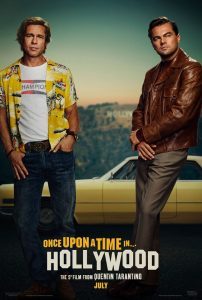
The Field: Tom Hanks, “A Beautiful Day in the Neighborhood”; Anthony Hopkins, “The Two Popes”; Al Pacino, “The Irishman”; Joe Pesci, “The Irishman”; Brad Pitt, “Once Upon a Time…in Hollywood”
Who Will Likely Win: Brad Pitt (though God knows why). He’s won virtually everything leading up to the Oscars, and that probably won’t change on awards night (but see below). Given that this is his fourth acting nomination without a win, he may finally break through that barrier this time if present conditions hold.
Who Should Win (Based on the Nominees): Tom Hanks. The veteran actor’s portrayal of children’s TV legend Fred Rogers is spot-on, a fitting and reverent tribute to someone who impacted so many lives in so many positive ways. It’s the kind of performance that’s easy to warm up to, and Hanks makes the most of it, a depiction worthy of the big prize.
Who Should Win (Based on All Eligible Candidates): Tom Hanks, though there are certainly many worthy contenders, both among the nominees (Al Pacino and Joe Pesci) and others (see below). They’re all about on par with one another, and any of them would make good winners.
Possible Dark Horse: Tom Hanks. While Pitt seems to be on firm footing going into the Oscars, my gut tells me that his standing is not a lock, and that’s where Hanks comes in, for several reasons. For starters, Pitt’s character is somewhat edgy, perhaps a little more so than what suits the safe sensibilities of the Academy these days. Also, given that voters tend to support those whom they believe evoke the “right” image of their industry, this intangible can influence how the ballots are cast. Hanks fits the bill on both of these fronts: He plays a nice guy, and he is a nice guy, possessing a likability factor far stronger than the sometimes-cheeky image of Bad Boy Pitt. While voters have conceded the early rounds to Pitt, they might back off when it comes to the brass ring, and, based on his character (and his character!), that could open the door for Hanks. Admittedly, the odds for this are probably rather long, but it’s not entirely inconceivable.
Also-Rans: Anthony Hopkins, Al Pacino and Joe Pesci. They should consider their nominations their awards.
Who Should Have Been Left Out: Brad Pitt. I find it unfathomable that Pitt’s performance is seen as the best in this category. The reason: He doesn’t do anything for most of his screen time, so what’s to honor? As much as I usually enjoy the antics of his comedic performances, there’s not much to latch onto here. Truthfully, I can’t really blame him for that, because the vapid, vacuous material he’s been handed doesn’t give him much to work with. And, because “there’s no there there,” there’s really nothing to recognize, either. His exclusion would have opened up the door for a number of other more deserving contenders.
Who Else Should Have Been Considered: There were a number of other worthy performances deserving of consideration, including Alan Alda, “Marriage Story”; Ray Liotta, “Marriage Story”; Shia LaBeouf, “Honey Boy”; Lucas Hedges, “Honey Boy”; Noah Jupe, “Honey Boy”; Chris Cooper, “A Beautiful Day in the Neighborhood”; Zack Gottsagen, “The Peanut Butter Falcon”; Taika Waititi, “Jojo Rabbit”; Alessandro Nivola, “The Art of Self-Defense”; Sam Rockwell, “The Best of Enemies”; Sam Rockwell, “Richard Jewell”; John Lithgow, “Bombshell”; Dean-Charles Chapman, “1917”; and Jamie Foxx, “Just Mercy.” Another possible contender (who could end up being a 2021 candidate) is Ben Mendelsohn, “Babyteeth”
Snubs: There are no obvious snubs here, but that doesn’t mean there weren’t other worthy contenders, as noted above. I believe good cases could be made for the actors from “Marriage Story” and “Honey Boy,” though they likely lacked the support to put them over the top and into the field.
Best Supporting Actress
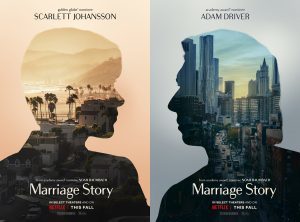
The Field: Kathy Bates, “Richard Jewell”; Laura Dern, “Marriage Story”; Scarlett Johansson, “Jojo Rabbit”; Florence Pugh, “Little Women”; Margot Robbie, “Bombshell”
Who Will Likely Win: Laura Dern. Having taken home the Golden Globe, Critics Choice and Screen Actors Guild Awards in this category, Dern is well on her way to locking up this honor – and deservingly so.
Who Should Win (Based on the Nominees): Laura Dern. She’s great, and, with this being her third nomination without a prior win, it’s her time.
Who Should Win (Based on All Eligible Candidates): Laura Dern. Are we seeing a pattern here? But, with that said, there are three other excellent portrayals that would be just as deserving: Octavia Spencer for “Luce,” Shuzhen Zhao for “The Farewell” and Jamie Lee Curtis for “An Acceptable Loss,” fine performances that should have received far more attention than they did.
Possible Dark Horse: Kathy Bates. Having won the National Board of Review award in this category, Bates is the only actress to have bested Dern this year, and that could keep her in the running. However, given the juggernaut that Dern has been building, it may be difficult for anyone to stop her from taking home the statue.
Also-Rans: Anyone who isn’t Laura Dern, but that’s especially true for Florence Pugh and Margot Robbie, despite the strength of their performances.
Who Should Have Been Left Out: Scarlett Johansson. As wonderful as Johansson is in “Marriage Story,” her performance here comes up a little short by comparison. With a more deserving nomination under her belt for her other role, this slot should have been left open for someone else. It should be noted, though, that there’s always the possibility (admittedly remote) that she could take home the award in this category as “the consolation prize” for losing out on the lead actress award (much the same way Jessica Lange did in her 1983 supporting actress win for “Tootsie” after losing out on the evening’s top prize for “Frances”). I don’t expect that to happen, but it’s not out of the realm of possibility.
Who Else Should Have Been Considered: There were a number of other worthy performances deserving of consideration, including Annette Bening, “The Report”; Octavia Spencer, “Luce”; Naomi Watts, “Luce”; Andrea Bang, “Luce”; Shuzhen Zhao, “The Farewell”; Jamie Lee Curtis, “An Acceptable Loss”; Jamie Lee Curtis, “Knives Out”; Toni Collette, “Knives Out”; Tilda Swinton, “The Dead Don’t Die”; Maggie Smith, “Downton Abbey”; Taylor Russell, “Waves”; Olivia Wilde, “Richard Jewell”; Nicole Kidman, “Bombshell”; and Allison Janney, “Bombshell.”
Snubs: The most obvious snub here was the exclusion of Jennifer Lopez for “Hustlers,” though, like Adam Sandler in the best actor category, Academy voters got it right where this performance was concerned, a solid but overrated portrayal not worthy of a nomination. A lesser-known but more disappointing snub in this category was the exclusion of Shuzhen Zhao for her superb performance as the lovable grandmother in “The Farewell,” a nod that should have gone to her instead of Johansson’s secondary, throwaway nomination.
Best Director

The Field: Martin Scorsese, “The Irishman”; Todd Phillips, “Joker”; Sam Mendes, “1917”; Quentin Tarantino, “Once Upon a Time…in Hollywood”; Bong Joon Ho, “Parasite”
Who Will Likely Win: It’s open season, and potentially anyone could win. A valid case could be made for each nominee: Martin Scorsese is a Hollywood legend (and an adored favorite), and there are many fans of “The Irishman” among Academy voters. Todd Phillips’s film “Joker” received the most nominations of any picture, and it made a boatload of money, so a statue in this category could be seen as a reward for his efforts. Sam Mendes has directed a brilliant film, the kind that Hollywood loves to honor (often along with said picture’s creator), and he has already won Golden Globe and Critics Choice Awards for it. Quentin Tarantino, a longtime Tinsel Town darling, has never picked up a director’s award, despite two screenplay wins, an “oversight” that voters may want to correct this year. And Bong Joon Ho, the true artist of the field, has demonstrated the skill deserving of this honor, having won a Critics Choice Award in this category and capturing the top prize at the Cannes Film Festival with his edgy but incisive offering.
To complicate matters, the winner of this award is very much tied to the result in the best picture category. For many years, the awards for best picture and director were solidly aligned in tandem. However, in recent years, once-rare splits have become much more commonplace, and I strongly suspect that will be the case again this year. And, given that each of the five films in this category also have strong cases in their favor for best picture, determining exactly how a split would play out is difficult considering the many possible permutations involved.
So what is the most likely scenario? Essentially, anything is possible, though I’m fairly certain that one film won’t take home both awards. Given what’s happened in this year’s awards season thus far, I believe Scorsese and Phillips are the nominees most “easily” eliminated. Of the remaining nominees, Bong Joon Ho, for all his brilliance and despite his CCA victory, may well be the candidate on the outside looking in. That leaves Tarantino and Mendes, and I suspect this is the pair that will ultimately duel it out for the statue. Given my best picture award prediction (see below), if there’s to be a split for the winners in these two categories, I’d have to give the edge to Tarantino, especially since he has never received an Oscar in this category and Mendes has (for “American Beauty” in 2000). However, with all that said, I could still be wrong.
Who Should Win (Based on the Nominees): Bong Joon Ho. “Parasite” is my favorite film of 2019, and it would not have earned that distinction were it not for its director. He is the class of the field and truly deserves to win.
Who Should Win (Based on All Eligible Candidates): Bong Joon Ho. Need I say more?
Possible Dark Horses: As I see it, all of the nominees in this category are equally favorites and dark horses. However, based on what I wrote above, if Tarantino is the most likely contender to take home the prize, the dark horses who stand the best chance of an “upset” are Bong Joon Ho and Mendes (if such wins could even be accurately characterized as such).
Also-Rans: Whoever doesn’t win!
Who Should Have Been Left Out: Martin Scorsese, Todd Phillips and Quentin Tarantino. It might sound a bit outlandish to exclude three industry heavyweights, but I have my reasons. “The Irishman,” while a good film, is not quite up to Scorsese’s usual standards, and his inclusion here somewhat undermines the quality of his past – and far better – efforts. As for “Joker,” the picture represents an ambitious step up for Phillips as a filmmaker, but the movie is not without its problems, detractions that keep it from being truly great (and worthy of a nomination in this category). But the biggest issue for me here is with Tarantino, the most overrated director in the business today and the creator of a truly awful picture, one that’s boring, pointless, needlessly gratuitous and in just plain bad taste. I’m completely at a loss to understand the fascination with his work, and I’m truly disheartened that he may well be on the brink of winning an award for which he is so ill-suited.
Who Else Should Have Been Considered: There were a number of other worthy directorial efforts deserving of consideration this year, including Noah Baumbach, “Marriage Story”; Scott Z. Burns, “The Report”; Julius Onah, “Luce”; Lulu Wang, “The Farewell”; Dexter Fletcher, “Rocketman”; Kent Jones, “Diane”; Jordan Peele, “Us”; Cristina Gallego and Ciro Guerra, “Birds of Passage” (“Pájaros de verana”); and Todd Haynes, “Dark Waters.” Other possible contenders (who could end up being 2021 candidates) are Shannon Murphy, “Babyteeth,” and Andrés Wood, “Spider” (“Araña”).
Snubs: Many Oscar watchers were surprised by the exclusion of Greta Gerwig for “Little Women” in this category. Gerwig earned considerable, though somewhat hyped, praise for her work on “Lady Bird” (2017), and she was expected to capture another best director nomination here. But, in my opinion once again, Academy voters got this one right; “Little Women” is an underwhelming effort with a number of problems and, with the possible exception of Pugh’s supporting actress nod, is far from deserving of the six nominations it has received. A more inexcusable snub would be the exclusion of Jordan Peele for “Us,” a remarkable film that didn’t pick up any nominations but that should have received ample accolades, including in this category. One could also argue that the exclusions of Lulu Wang for “The Farewell,” Noah Baumbach for “Marriage Story” and Dexter Fletcher for “Rocketman” represent snubs, though perhaps not to the same degree as the others.
Best Picture

The Field: “Ford v Ferrari,” “The Irishman,” “Jojo Rabbit,” “Joker,” “Little Women,” “Marriage Story,” “1917,” “Once Upon a Time…in Hollywood,” “Parasite”
What Will Likely Win: It’s open season here among several contenders, but, based on how matters are likely to play out in the directors’ race and on the winners selected in this season’s early competitions, I would give the edge here to “1917.” This movie has all of the elements that make for a classic best picture winner. It’s the kind of grand, sweeping epic that Hollywood likes to think it makes all the time. Also, it’s a period piece rooted in historical fact, the kind of story the industry loves to honor. Finally, it’s the sort of “safe” choice that the Academy has been leaning toward in this category more in recent years. Add to all that the fact that the picture captured the Producers Guild Award for best feature film – often a solid predictor of the eventual Oscar winner – and you’ve got an amalgamation of elements that lend themselves well to a winning combination, one that I feel confident will unfold on award night.
What Should Win (Based on the Nominees): “Parasite.” Hands down, this is the best picture of 2019. Thankfully the Academy wisely thought it deserved to be included in the field of nominees, a rare feat for a foreign language film.
What Should Win (Based on All Eligible Candidates): “Parasite.” Again, need I say more?
Possible Dark Horses: “Parasite,” “Once Upon a Time…in Hollywood,” “The Irishman” and “Joker.” See the above discussion regarding the best director award. Again, it might seem strange to consider these films “dark horses,” but much depends on how the projected split noted above plays out. If the director award moves in a different direction, the winner in this category is likely to follow suit.
Also-Rans: “Ford v Ferrari,” “Jojo Rabbit,” “Little Women” and, sadly, “Marriage Story.” These films should consider their nominations their awards.
What Should Have Been Left Out: This is a terrible field. It’s more accurately characterized by what should have been left in, with the rest of them dumped. In my opinion, the only nominees worth keeping are “Marriage Story,” “1917” and “Parasite.” “Ford v Ferrari,” “Joker,” “Jojo Rabbit” and “The Irishman” are marginal, and “Little Women” and “Once Upon a Time…in Hollywood” never should have been considered, let alone included.
What Else Should Have Been Considered: It’s truly unfortunate that the Academy has taken such a narrow (some might say “dim”) view of the available offerings, especially in light of what ended up making the cut. There were many others worthy of consideration, including “Diane,” “The Report,” “Luce,” “The Farewell,” “Rocketman,” “Us,” “Birds of Passage” (“Pájaros de verana”), “Official Secrets” and “Dark Waters.” Other possible contenders (which could end up being 2021 candidates) are “Babyteeth” and “Spider” (“Araña”).
Snubs: The Academy’s decision to leave out “Us,” “Rocketman” and “The Farewell” was unfortunate. They all belong here instead of some of the lesser offerings that were included.
Sadly, 2019 was a rather mediocre year for movies, largely devoid of quality offerings for much of the first half and only redeeming itself somewhat in the concluding months. Here’s hoping 2020 brings viewers a better selection of choices.
In the meantime, the Oscars will be handed out in televised ceremonies on Sunday February 9. I’ll post my report card on these predictions thereafter. Enjoy the show!
(Oscar® and Academy Award® are registered trademarks of the Academy of Motion Picture Arts & Sciences.)
Reviews of some of the leading contenders are available at the following links:
“A Beautiful Day in the Neighborhood”
Reviews of other films that should have been in the running are available at the following links:
Copyright © 2020, by Brent Marchant. All rights reserved.
The post Who Will Win This Year’s Oscars? appeared first on Brent Marchant.



